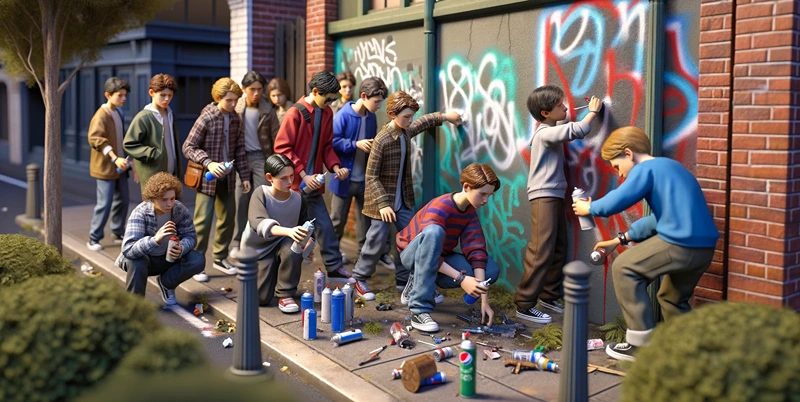
Feature Article: An In-Depth Look at Juvenile Vandalism Defenses and Penalties Under Arizona Law
Vandalism, defined as the intentional destruction or damage of property, is a serious crime that can have severe consequences. When a juvenile is charged with vandalism in the state of Arizona, it is important to understand the definitions of vandalism, the potential penalties, and the options available for defense. This article examines the intricacies of juvenile vandalism charges in Arizona, including consequences, defense strategies, and the workings of the juvenile court system.
The Definition of Vandalism Under Arizona Law
Under Arizona law, vandalism is defined as intentionally defacing, damaging, or destroying any real or personal property that belongs to another person or entity. This definition includes graffiti, keying a car, or damaging public property such as park benches or street signs.
Graffiti, specifically, is considered an act of vandalism in Arizona and can be punishable by law. It is illegal to deface public or private property with any type of graffiti, paint, or marker.
Consequences of a Juvenile Vandalism Charge
If a juvenile is charged with and convicted of vandalism in Arizona, the consequences can be severe. Depending on the crime's severity and the offender's age, the penalties can range from community service and fines to juvenile detention and probation.
Additionally, a conviction for vandalism can carry long-lasting consequences, including challenges obtaining employment, housing, and financial aid, as well as damaging one's reputation.
What If I Accidentally Vandalized Someone's Property?
It is essential to know the intent behind the damage in determining whether or not an individual has committed vandalism. If the damage was not intentional, the individual may be able to argue that they did not commit the crime.
However, if the damage was intentional, the prosecution must prove that the juvenile willfully and maliciously damaged the property to secure a conviction.
How Does the Juvenile Court System Work?
In Arizona, juvenile vandalism charges are heard in juvenile court. Unlike adult criminal courts, the focus of juvenile courts is to rehabilitate the offender rather than punish them.
In many cases, after a juvenile is charged, they will be required to appear before a juvenile court judge, who will determine the course of action based on the evidence and the circumstances surrounding the offense. The judge may impose penalties such as community service, counseling, probation, or confinement.
Defense Strategies for Juvenile Vandalism Cases
There are several defense strategies that a skilled criminal defense attorney can use to mitigate the consequences of a juvenile vandalism charge under Arizona law.
One strategy could be to argue that the damage was not willful or malicious, such as in cases of accidental vandalism. Another defense strategy could be to assert that the prosecution failed to prove the juvenile's intent to damage or destroy the property beyond a reasonable doubt.
It may also be possible to negotiate a plea bargain that results in less severe penalties or explore alternative pathways to resolving the issue, such as mediation or restitution.
Frequently Asked Questions
What should I do if my child is facing juvenile vandalism charges?
If your child is facing vandalism charges, it is essential to act quickly to protect their rights and interests. Hire a skilled criminal defense attorney familiar with juvenile crimes and the Arizona juvenile justice system. A knowledgeable attorney can provide personalized legal counsel and advocate for your child's best interests.
Is it possible to have a juvenile vandalism charge sealed or expunged from my record?
Yes, under certain circumstances, a juvenile may be able to have their vandalism charges sealed or expunged. An experienced criminal defense attorney can help determine if this is a possibility for your case.
What is the difference between juvenile court and adult criminal court?
The primary difference between juvenile court and adult criminal court is the approach to punishment. While adult criminal court emphasizes punishment for the offender's crime, juvenile court aims to rehabilitate the offender and provide opportunities for positive growth and change.
How a Criminal Defense Attorney Can Help
If your child is facing vandalism charges in Arizona, it is essential to work with a skilled criminal defense attorney. A knowledgeable attorney can help you understand the charges, assess the evidence, and develop a strategy to reduce the charges' impact on your child's future. To learn more, contact Kolsrud Law Offices.
Juvenile Vandalism Defenses and Penalties Under Arizona Law-








No comments:
Post a Comment
Note: Only a member of this blog may post a comment.